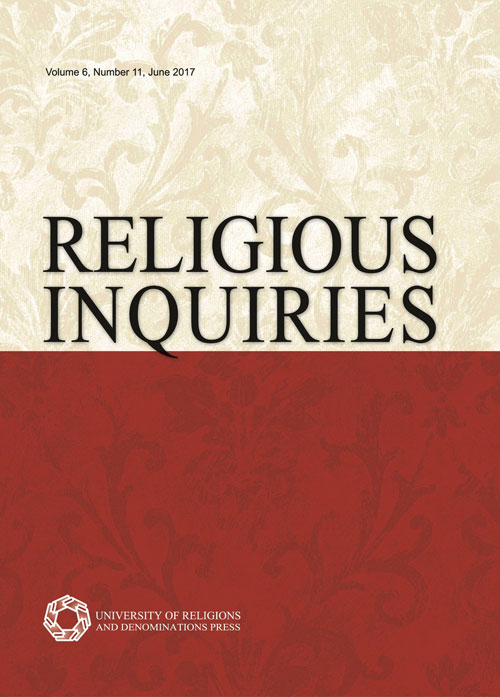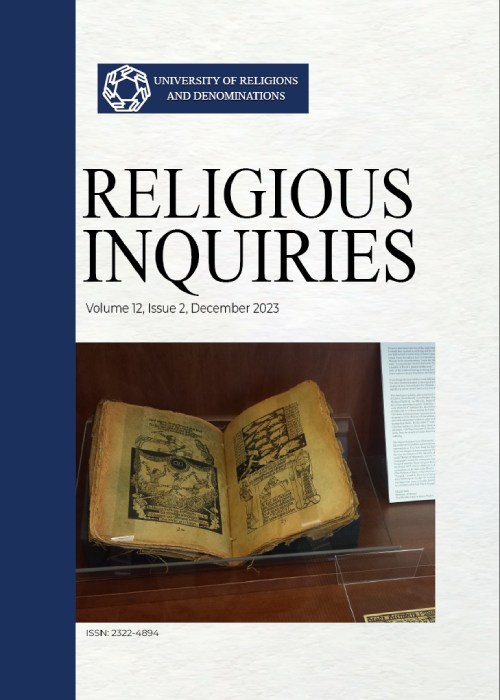فهرست مطالب

Religious Inquiries
Volume:6 Issue: 1, Winter and Spring 2017
- تاریخ انتشار: 1396/07/26
- تعداد عناوین: 6
-
-
Pages 5-21When we know and recognize one another, our souls join with those of others. This is called taaruf in the parlance of the Quran. Taaruf increases love and unity, as it decreases violence and enmity. Knowing one another occurs in several ways. One way to know others is to love the same thing that they do. This means that several people will love a similar spiritual being. From the Shia perspective, this is a very important way in which people can understand and sympathize with one another. Sharing a common beloved also creates a loving relationship between oneself and others. Many people come to love one another since they share love for the same being and because their love is directed to the reality of the Truth, which is an all-inclusive reality. To create a love such as this requires a strong remembrance which comes about through the remembrance of the beloved, ones sufferings for. Communication based on such love differs widely from the peace that is based on using a scapegoat, as described in Rene Girards Violence and the Sacred.Keywords: Taaruf, suffering, scapegoat, Violence, Sacred
-
Pages 23-36Rāmānuja was the founder of Visistādvaita Vedānta School, which is one of the three main schools of Vedānta. According to Rāmānuja, the soul (cit), Brahman, and matter (acit) constitute the three principal ontological realities. Rāmānuja provides some proofs for the existence of the soul, which are mostly based on self-consciousness. The relationship of the soul with the matter, on one hand, and with that of Brahman, on the other, is similar to that between the body and the soul. Therefore, He is the Soul of souls. Using this idea, Rāmānuja explains Gods action, which is the basis of the concept of Gods grace and favor within the man. The main traits of the soul according to Rāmānuja are eternity, knowledge, bliss, incomprehensibility, individuation, the distinction from Brahman and other souls, simplicity, and free-will. In its pure state, the soul has these attributes in an unadulterated manner. However, they get contaminated by ignorance and its negative consequences. The emancipation of the soul from samsara depends on the self-recognition and its differentiation from acit or matter.Keywords: cit, soul, Rāmānuja, acit, self, Visistādvaita Vedanta
-
Pages 37-49This article explores the life and importance of Mary in Islam and Christianity, aiming at clarifying the criteria for which Mary has been revered in each tradition. It will be shown that Mary in Christianity is almost merely important because she was the mother of Jesus, while the Muslim reverence for her is based on her own noble characteristics. From the Muslim perspective, even if Mary had not been Jesus mother, she would have been a prominent figure and a great example for believers.Keywords: Mary, Jesus, Christian-Muslim dialogue
-
Pages 51-64This article discusses Clement of Alexandrias doctrine of Scripture based on the terms voice of God, first principle, and demonstration that he uses for Scripture. By studying the usage of these terms and the related passages, it will be made clear that Clement regards Scripture as a vessel of Gods voice, favoring what is now called the theory of verbal inspiration. Moreover, the divine voice, like the voice of sirens, leaves no choice for the listeners but to submit and follow. This absolute submission is rational, because Scripture is a first principle, whose truth does not depend on any demonstrations. However, those who firmly believe in its truth will find abundant demonstrations in it that will guide them to a better and deeper understanding of its teachings.Keywords: Clement, verbal inspiration, biblical authority, first principle, Demonstration
-
Pages 65-81Theistic and atheistic beliefs respectively play a fundamental role in the definition of man's free will and moral responsibility, so far as they can determine the nature, quality, and quantity of human's freedom. After believing in God, the belief in a revealed or a non-revealed religion and the manner in which Gods attributes are interpreted play an essential role in the definition of free will. In fact, the nature of our understanding of some of Gods attributessuch as His knowledge, power, will, creation, and sovereigntyas well as His relation to human beings can impact the way we envision the quality and quantity of mans free will. In revealed religions, God is introduced as the personal and all-powerful being, who is the real creator of humans, and humans are considered His creatures, servants, and vicegerents. Human free will and moral responsibility is defined in the light of such a theistic perspective.Keywords: God, revealed religions, divine attributes, free will, moral responsibility
-
Pages 83-94In this paper, the need for interfaith dialogue in the contemporary world has been emphasized in the light of the rise of ISIS and other takfiri movements. This necessity has been understood both by political and religious authorities in the Shiite world and by Christian religious authorities. It will be shown that the central message of all Abrahamic religions is theism; that is, the worship of God and justice as opposed to egotism or self-worship. Then, it will be explained how, in the context of interreligious dialogue, relativism as opposed to realism is a main philosophical barrier, and exclusivism as opposed to inclusivism tends to be a major dogmatic barrier.Keywords: interfaith dialogue, theism, relativism, exclusivism


